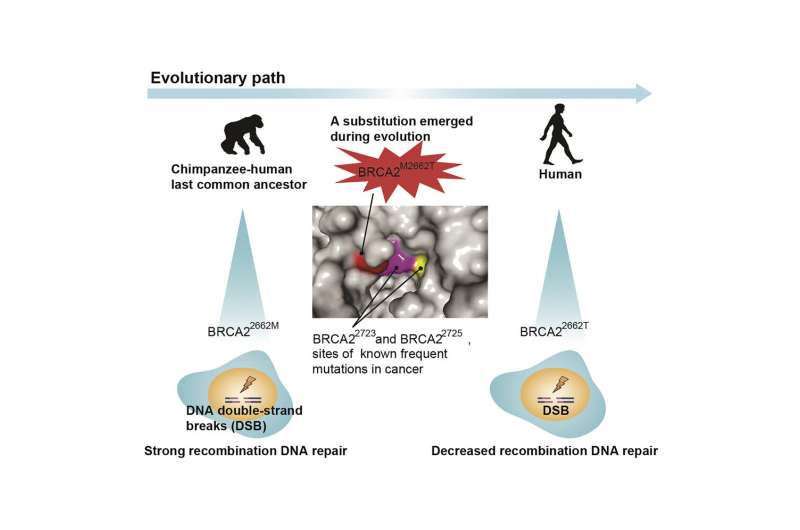May 4, 2022 report
Evidence that a DNA change made humans more susceptible to cancer

A team of researchers at the Sloan Kettering Institute working with a group at the American Museum of Natural History has found evidence of a change in human DNA after diverging from other primates that has made humans more susceptible to the development of cancerous tumors. In their paper published in the journal Cell Reports, the group compares human genes to those of other primates to learn more about why humans are more prone to developing cancer.
Prior research has shown that humans are more likely to develop cancerous tumors than any other primate, but the reason has remained a mystery until now. To find the answer, the researchers compared parts of the human genome with similar parts of 12 non-human primate genomes. They found a small difference in the BRCA2 gene that had to have arisen after humans diverged from other primates. The BRCA2 gene plays a role in tumor suppression due to coding for DNA repair.
The researchers then looked at the impact of the letter change in the human DNA and found that it lessened its effectiveness at coding for DNA repair by approximately 20%. And that, the researchers suggest, could explain why humans are more susceptible to the development of tumors. The findings align with results from prior research that has shown that humans with a certain BRCA2 variant are more likely to develop tumors, particularly of the ovaries and breast.
What still remains a mystery is why humans evolved to have a BRCA2 gene that increases the risk of developing cancer, though there is the possibility that it was a tradeoff between an increased risk of cancer and an increase in fertility rates. Prior research has shown that women with a BRCA2 variant that makes them more susceptible to developing cancer can more easily become pregnant. The work also suggests that a means for treating cancer in the distant future may involve altering the BRCA2 gene to make it more like other primates, thereby reducing the overall risk of developing cancer.
More information: Christine A. Iacobuzio-Donahue, Evidence for Reduced BRCA2 Functional Activity in Homo Sapiens After Divergence from the Chimpanzee-Human Last Common Ancestor, Cell Reports (2022). DOI: 10.1016/j.celrep.2022.110771. www.cell.com/cell-reports/full … 2211-1247(22)00535-6
Journal information: Cell Reports
© 2022 Science X Network




















